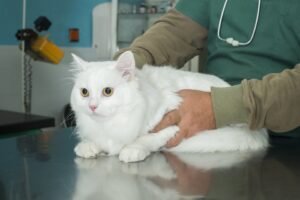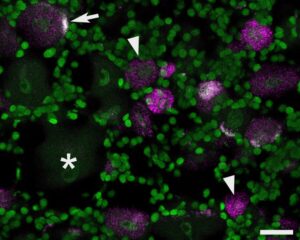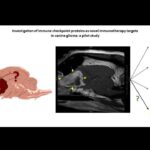Projects awarded funding in 2025
This is a summary of the grants that have been awarded funding so far this year. For further details of project aims, please view them by disease area.

Exploring the role of cancer stem cells in feline injection-site sarcomas: active metabolic pathways and therapy responses
Student Research Project: £1,400
Institution: University of Edinburgh
Lead researcher: Lisa Pang
Aim: By identifying the characteristics of feline infection site sarcoma stem cells, there is the potential to select drugs that target proteins or metabolic pathways that drive tumour growth.

A laboratory appraisal of SCN10A as an analgesic target in canine sensory neurons
Student Research Project: £2,800
Institution: University of Glasgow
Lead Researcher: Andrew Bell
Aim: Novel pain killing drugs in humans target the neuron-specific sodium channel Nav 1.8, but it is unclear if these drugs will work in dogs. By understanding the cellular patterns of Nav 1.8 in the dorsal root ganglion, the hope is to be able to rationalise the use of novel pain killers in dogs and ultimately treat pain better.

Surveillance of antimicrobial resistance in clinical infections from companion animals
Student Research Project: £2,400
Institution: University of Liverpool
Lead researcher: Dorina Timofte
Aim: To generate novel standardised antimicrobial susceptibility testing data from bacterial isolates and compare these with original laboratory data, with a view to harmonising data from companion animal AMR surveillance.

CD44 expression in feline cholangiocarcinoma: A potential therapeutic target?
Student Research Project: £3,200
Institution: RVC
Lead researcher: Alejandro Suárez-Bonnet
Aim: The discovery of therapeutic targets in feline liver cancer would be a major breakthrough in veterinary medicine and oncology which will almost certainly pave the way for immediate further clinical research, initially in vitro, and hopefully, in vivo.

Investigation of immune checkpoint proteins and novel immunotherapy targets in canine glioma: a pilot study
Student Research Project: £2,400
Institution: RVC
Lead researcher: Andy Yale
Aim: Novel treatment strategies beyond surgery, radiation therapy and chemotherapy are desperately needed for canine glioma as outcomes have remained stagnant over the last decade; this study aims to investigate the expression of immune checkpoint proteins as possible immunotherapy targets.

Investigating the therapeutic potential in canine cranial cruciate ligament disease of bovine milk-derived extracellular vesicles using an in vitro cell-based model
Student Research Project: £2,800
Institution: University of Liverpool
Lead researcher: James Anderson
Aim: Milk-derived extracellular vesicles present a promising, low-cost, and easily scalable therapeutic option for treating or preventing canine cranial cruciate ligament disease, which significantly impacts a dog’s quality of life. Their integration into current treatment protocols could lower costs, improve accessibility, and reduce the number of untreated cases, ultimately enhancing canine welfare.

Determining the presence of Gram-negative ESKAPE organisms and antimicrobial-resistant Escherichia coli in commercially available alternative diets for dogs and cats
Master’s Degree by Research: £41,730
Institution: University of Liverpool
Lead researcher: Genever Morgan
Aim: These bacteria have the potential to cause serious, difficult-to-treat infections, so this study will add to the evidence about the microbiological risks of certain pet diets, providing valuable information for veterinary professionals and pet owners.
Click on the links below to read about other studies that we have funded recently:
Projects awarded funding in 2024
Projects awarded funding in 2023
Projects awarded funding in 2022
Project awarded funding in 2021
